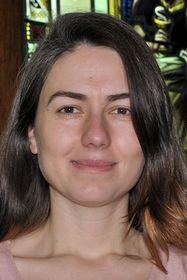
Dr. Sihong Wang, associate professor of biomedical engineering, Grove School of Engineering

Dr. Zeynup Deneli Korkut
Dr. Zeynep Dereli Korkut forms company to commercialize 3D microfluid testing chamber designed as thesis project in lab of Professor Sihong Wang
Supported by a NSF CAREER grant awarded in 2011, Dr. Sihong Wang, associate professor of biomedical engineering in City College’s Grove School of Engineering has been working with students to develop three-dimensional microfluid cell array for screening anti-cancer drugs.
Now, one of her former graduate students, Dr. Zeynep Dereli Korkut, who developed the technology while working on her PhD, has established a biotech company with Professor Wang and a collaborator at Memorial Sloan Kettering Cancer Center to bring the technology to market.
If she is successful, not only could new cancer drugs be brought to market sooner, but, physicians will be able to prescribe the right therapeutics for their patients faster and increase their chances of survival.
“We have successfully created a technology that can mimic in vivo the microenvironment of the blood microvessels that deliver drugs to tissue,” said Professor Wang. “However, we need to scale up the technology in order for it to be commercially viable.”
“We have already talked to more than 100 potential customers about the device, so we know the need is there,” said Dr. Dereli Korkut, who is currently participating in the New York City Economic Development Corp.’s ELabNYC program. “Right now, there are no in vitro realistic tumor models for evaluating the efficacy of potential anti-cancer drugs. We need such a model to test drugs efficiently before they are given to patients.”
The device Dr. Dereli Korkut developed in Professor Wang’s lab uses fluid dynamic theories to allow drugs to interact with cancer cells encapsulated in hydrogel (synthetic gel to mimic supporting materials around cells in vivo) inside the microchambers. The prototype consists of 64 micro-chambers arranged in an 8x8 array. However, “a device with 1,000 micro-chambers arranged in a 10x100 array is our next goal,” said Dr. Dereli Korkut.
One market for the device is in clinical settings, where different drugs can be tested to assess their effectiveness against a patient’s illness. Another potential market is targeting pharmaceutical companies, who are trying to identify new drugs that are effective against different kinds of cancers.
Bringing the device to market poses all sorts of engineering challenges, Professor Wang noted. “We need to reduce the complexity of both inlet and outlet and still be able to accommodate more than 100 drug stimuli at a time,” she said. Also, it has to be modified for use with biopsy samples as well as to handle high-throughput testing for the pharmaceutical and biotech industries.
Dr. Dereli Korkut estimates she needs to raise at least $1,000,000 in the first two years to continue prototype development and that several million more will be required to fully commercialize it. Together with Dr. Wang, she has applied to several foundations that support translational research for grants as well as to the National Institutes of Heath for support through the SBIR (Small Business Innovation Research) program, which provides funds to small businesses affiliated with nonprofit research institutions, including colleges.
Asked about her decision to start a company, Dr. Dereli Korkut explained, “I see a need people have and I am trying to solve a problem. For me, seeing our technology have an impact on society is very rewarding.”
About The City College of New York
Since 1847, The City College of New York has provided low-cost, high-quality education for New Yorkers in a wide variety of disciplines. More than 16,000 students pursue undergraduate and graduate degrees in: the College of Liberal Arts and Sciences; the Bernard and Anne Spitzer School of Architecture; the School of Education; the Grove School of Engineering; the Sophie Davis School of Biomedical Education, and the Colin Powell School for Civic and Global Leadership. U.S. News, Princeton Review and Forbes all rank City College among the best colleges and universities in the United States.
About The Grove School of Engineering at CCNY
The Grove School of Engineering at The City College of New York is the only public engineering school within New York City. It offers Bachelors, Masters and Ph.D. degrees in seven fields: biomedical, chemical, civil, computer, electrical, and mechanical engineering and computer science. The School is recognized nationally for the excellence of its instructional and research programs and ranks among the most diverse engineering schools in the country.
MEDIA CONTACT
Ellis Simon
p: 212.650.6460
e:
esimon@ccny.cuny.edu